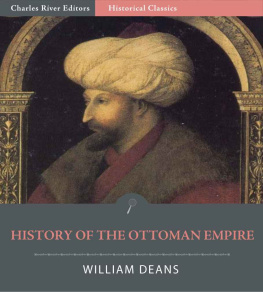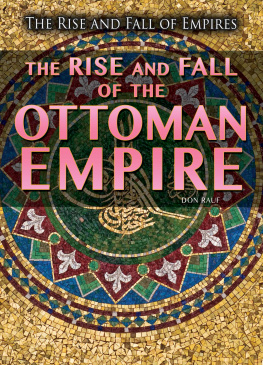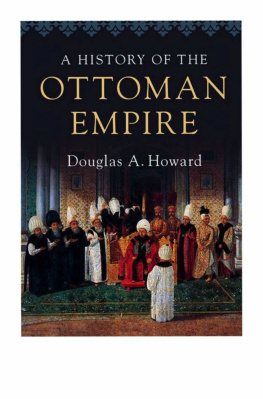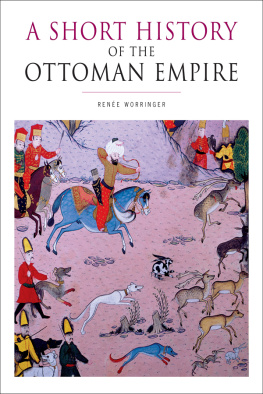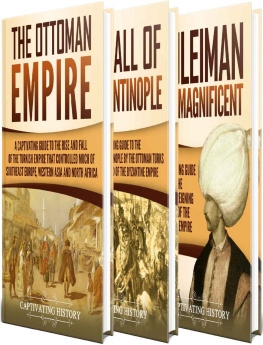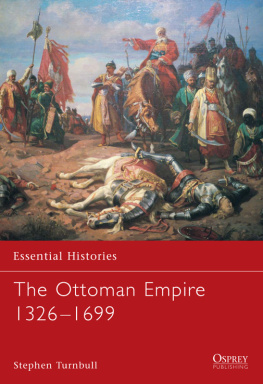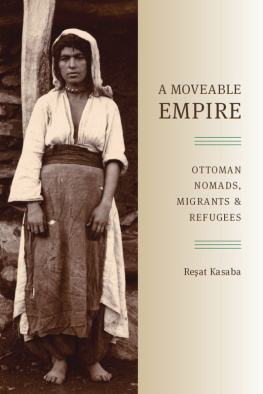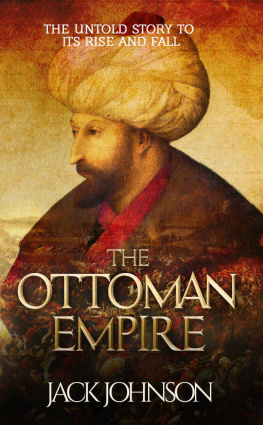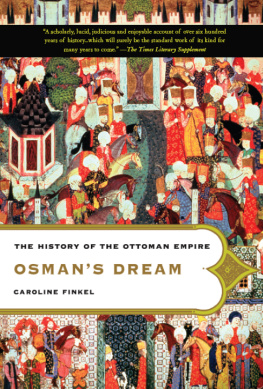William Deans - History of the Ottoman Empire
Here you can read online William Deans - History of the Ottoman Empire full text of the book (entire story) in english for free. Download pdf and epub, get meaning, cover and reviews about this ebook. year: 2011, genre: Romance novel. Description of the work, (preface) as well as reviews are available. Best literature library LitArk.com created for fans of good reading and offers a wide selection of genres:
Romance novel
Science fiction
Adventure
Detective
Science
History
Home and family
Prose
Art
Politics
Computer
Non-fiction
Religion
Business
Children
Humor
Choose a favorite category and find really read worthwhile books. Enjoy immersion in the world of imagination, feel the emotions of the characters or learn something new for yourself, make an fascinating discovery.
- Book:History of the Ottoman Empire
- Author:
- Genre:
- Year:2011
- Rating:5 / 5
- Favourites:Add to favourites
- Your mark:
- 100
- 1
- 2
- 3
- 4
- 5
History of the Ottoman Empire: summary, description and annotation
We offer to read an annotation, description, summary or preface (depends on what the author of the book "History of the Ottoman Empire" wrote himself). If you haven't found the necessary information about the book — write in the comments, we will try to find it.
History of the Ottoman Empire — read online for free the complete book (whole text) full work
Below is the text of the book, divided by pages. System saving the place of the last page read, allows you to conveniently read the book "History of the Ottoman Empire" online for free, without having to search again every time where you left off. Put a bookmark, and you can go to the page where you finished reading at any time.
Font size:
Interval:
Bookmark:
History of the Ottoman Empire
By William Deans
Foreword by Charles River Editors
www.charlesrivereditors.com

The Battle of Lepanto by Andries van Eertvelt
1835 1910
Deans treatise, History of the Otttoman Empire , chronicles 600 years of the empire from 1250 to 1850, including the Siege of Constantinople, the Battle of Lepanto, the Siege of Vienna, the war with Russia, and Greeces independence. A table of contents is included for easy navigation.
The astonishing rapidity with which a people whose origin is veiled in obscurity, started upon the scene of history, and by the extent of their conquests, caused such decided and permanent changes in Europe, places the Turks before us as a remarkable nation. Nor have their conquests been transient. Under the name of Ottomans, they have subdued to their dominion the fairest and most fertile portions of Asia and Europe, and they retain, in the midst of civilization, the primitive habits and manners brought with them from the mountains of Turkistan. While other nations in Europe have been gradually advancing in science, literature, and the arts, this people, until very lately, have despised every improvement that did not administer to their arrogance and sensuality.
Although the Ottoman empire has continued to recede for upwards of 150 years, during that period they have maintained many long and bloody wars with their powerful neighbors the Russians and Austrians; and independent of many external disasters, and the influence of long-continued internal oppression, they have often risen from the shock which seemed fatal to their cause, and they continue to hold their independence with vigor and tenacity. But even after this long period of decay, the world hardly affords a nobler empire than that which is swayed by the descendants of Othman. Bounded by the Euphrates on the east, the Mediterranean or the Libyan deserts on the south, the Adriatic on the west, and the Ukraine on the north, it numbers amongst its inland streams the Nile, the Danube, and the Euphrates, and includes the cities of Egypt, of Nineveh, of Babylon, and Constantinople. It enjoys every advantage which the bounty of nature can accumulate. The vine, the olive, the orange and citron adorn its slopes. The oak and the pine flourish on its mountains, and wheat, maize and rice wave on its plains, supplying, almost without the aid of the husbandman, everything that administers to the wants, the comforts or the luxury of man. But blasted by the despotism of the east and the rigidity of Mohammedan rule, all these blessings have not been able to stop the progress of internal as well as external decay.
An empire so extensive, and embracing provinces so remote, necessarily includes many different races and sects of people. Everywhere a half, in some places two-thirds, of the population of the empire are Christians; and nations and sects of all imaginable varieties compose the inferior classes of the Ottoman empire. The merchants are nearly all Greeks or Armenians, the sailors islanders from the Archipelago, the money lenders Jews, and the cultivators of the soil, generally descendants of the inhabitants of the old Greek empire. Yet three millions of Turks in Europe, and perhaps four millions in Asia retain all this heterogeneous population in subjection, and compel them to labor and pay taxes for the support of their government. The only parallel to this which the world exhibits, is the sway maintained by a much smaller number of British over the immense population of the Indian peninsula.
Although the Ottoman empire is still vast and extensive, it no longer attracts the fear of its neighbors. Neither the wisdom of its councils nor the valor of its forces are respected or feared in Europe. But the splendor of its former exploits and the celebrity of its ancient character arrest the attention of mankind. It is true that the wars of the Turks were disgraced by perfidy and stained by violence; but they exhibited such energy in pursuit and brilliancy in success that their claim to national preeminence for centuries stood undisputed.
While the social condition of the Turks, supported by every prejudice that can influence their manners, and confirmed by the inveterate habit of ages, may excite the pity or contempt of the Christian states, the maxims of their policy, and the injustice of their government, sanctioned alike by religion and law, have often incurred the indignation of Europe. The rapid progress of civilization, which during the last four centuries has so completely altered the civil and political institutions of the Western states, has made little perceptible progress in Turkey; and every discovery, whether in arts or science, which has contributed to the happiness and the power of man, has been obstinately resisted by the followers of Mahomet.
National prejudices strongly influence mankind. The patriotic mind may cling to the institutions of its country, and resist every encroachment tending to shake a fabric that has become venerable by the lapse of ages; but experience dissipates prejudices; and measures suggested by experience, calculated to ameliorate the condition of the people and to facilitate the progress of national improvement, will be readily adopted by every enlightened government. The policy of the Turks ever has been to resist innovation. Incapable of overcoming their national prejudices and of breaking the fetters which an uncompromising and sanguinary religion imposed upon them, they have remained a monument of social and political degradation. For three centuries after their settlement in Europe, the martial discipline and religious enthusiasm of the Turks, and the energy of their character, rendered them not only powerful but dangerous to the independence of Europe. At the period of the Ottoman invasion the Christian states were sunk to the lowest point of ignorance and political disorder, and were incapable of resisting the Turkish arms. Three centuries of conquest completed the period of Ottoman greatness; since then it has suffered a gradual decay. Such is the influence of religion, science, and learning on national fortunes, that those conquerors who nearly accomplished the overthrow of Christendom, are now protected and maintained in Europe by the arms of the Christian powers.
Many circumstances contributed to put an end to the ascendency of the Turkish empire. After the taking of Constantinople by the Turks in AD 1543 the Greeks took shelter in Italy, and imported a tincture of their science and of their refined taste in poetry and eloquence; and the esteem for literature gradually propagated itself throughout every nation in Europe. The art of printing invented about this time extremely facilitated the progress of all these improvements. The invention of gunpowder changed the art of war. Many innovations were soon made in religion, which greatly affected those that embraced them; and thus a general revolution was made in human affairs throughout this part of the world, and nations gradually attained that situation with regard to commerce, arts, science, police and cultivation in which they have ever since progressed.
The Turks, on the other hand, obstinately adhered to the barbarous maxims of their civil and religious institutions; and the arrogance of their character led them to resist all those improvements which so rapidly encouraged the civilization, and increased the power of Europe. The laws of war and maxims of policy brought with them from the Scythian deserts, or drawn from the Koran, began to render them odious to the civilized states; and they have not without reason been condemned for the illiberality, injustice, and feebleness of their government, the rudeness of their institutions, and the degradation to which they have fallen as a nation.
Next pageFont size:
Interval:
Bookmark:
Similar books «History of the Ottoman Empire»
Look at similar books to History of the Ottoman Empire. We have selected literature similar in name and meaning in the hope of providing readers with more options to find new, interesting, not yet read works.
Discussion, reviews of the book History of the Ottoman Empire and just readers' own opinions. Leave your comments, write what you think about the work, its meaning or the main characters. Specify what exactly you liked and what you didn't like, and why you think so.

